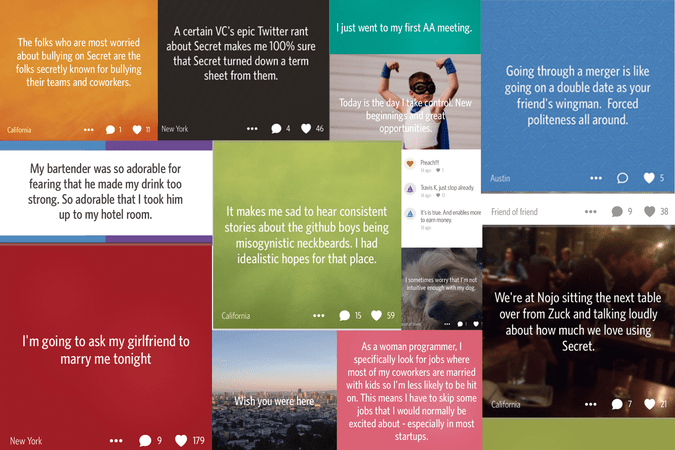If you keep up with the latest in social media, you know that new anonymity-protecting apps pop up every day.
Right now, it’s all about Whisper and Secret. But the trend goes further back than that. Chatroulette was everything in late 2009. And if you want to get real old school, there’s ICQ. Because who didn’t want a series of numbers as a username?
But what is it exactly about apps that promise anonymity that are so attractive? Why do users keep flocking to them, no matter what form they take? Let’s look at a few possible reasons.
We’ll be exploring the rise of anonymous mobile apps and services at MobileBeat 2014 in San Francisco on July 8-9.
Grab your tickets now!
More users
“Anonymous programs offer the ability to limit the scope of your social messaging by preventing your content from being tied to your real-life person,” says Brandon Harig, community director for Agency 720.
And this matters, given that the sheer volume of people online has increased dramatically over the past decade. Many people who reached adulthood when social media was still in its early days — those in their late twenties and thirties — tended to be “horribly guilty of over-sharing,” Harig says. But posts back then were frequently anonymous or “had limited consequences” if you were publishing to “LiveJournal, MySpace, or early Facebook.”
Now, the reach of what you post is expansive, and that’s scary. We’re talking “current and potential employers, family, influencers, anonymous advocates, and more,” Harig says. Anyone can take a peek at what you’re sharing, even those you don’t want to show it to. This makes anonymous apps a safer outlet for those with the over-share impulse.
Need for privacy
It seems like every other week there’s a new privacy concern cropping up on Facebook. When there’s a question as to whether or not your posts (that you’ve marked private) are truly private, people tend to get skittish about expressing themselves, according to David Neuman, social media manager at Prime Visibility, a digital marketing agency in Long Island, NY.
When you know your posts will live forever — whether you delete them or not — or your family and friends might not like what you say or share, you’re not going to be 100 percent authentic. Apps like Snapchat take away some of the risk of speaking honestly with your friends. After you send a message with the app, he says, “The content is immediately deleted, and users don’t have to worry about whether or not it will ever appear again.”
Need for an outlet
Ten years ago, the Internet was a very different place. There wasn’t an obligation to identify yourself online. People conversed in chatrooms and on forums under pseudonyms. Basically, you didn’t have to be “you” online.
David Ryan Polgar, digital lifestyle expert and tech ethicist, believes the anonymous social app phenomenon can be viewed as, “a counterweight to the ever-increasing civilized nature of social media.” So, while it may seem like people are seeking out apps that promise privacy, it’s more a case that people are responding to the lack of privacy across the majority of social media.
Think about it: You spend a lot of time working on your digital footprint. You build up your Facebook profile. If you write anything online, you’ll want to establish Google authorship. And you’ll definitely want to ensure that your presence on every social site is consistent. Your social profiles tend to be “a direct extension of [your] professional life,” Polgar says. Everything you put on Facebook and Twitter are for “public consumption.” Obviously, “an outlet was needed for sharing more private thoughts,” he says.
You can think of it as the “Keep the Internet weird movement.”
Will anonymous apps last?
Anonymous apps have a secure spot in our collective digital future. With the effort to build “one digital identity” through your social accounts, there will continue to be a push for apps and platforms that provide unquestioned anonymity, says Harig.
And Polgar agrees. “As more people realize the permanent nature of mainstream social networks … it will continue to open up opportunities for social networking platforms that promise an escape.” There may very well be two sides to the Internet. Sites like Facebook will act as “extensions” of work discussions, and anonymous apps and sites will act as the “proverbial bar or locker room,” says Polgar.
As long as people have the desire to speak freely somewhere online, anonymous social apps will have a role to play in how we interact.


